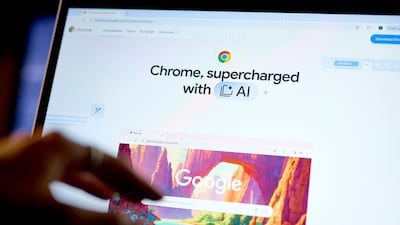Perplexity, the artificial intelligence start-up challenging Google's search supremacy, has made its boldest move yet.
Its unsolicited $34.5 billion bid for Google's Chrome browser follows last week's announcement that San Francisco-based Perplexity had teamed up with Trump Media and Technology Group for a public beta testing of an AI search feature called Truth Search AI.
The move highlights the growing influence of AI in all corners of tech – giving upstarts the confidence to challenge the majors, no matter how dominant they are.
Number crunch
Perplexity's $34.5 billion offer is nearly twice the size of its own valuation, which is pegged at about $18 billion following a recent $100 million funding round.
That makes the bid "unusual", especially as Perplexity is a young company, said Jesse Jarvis, chief executive of London AI company Kaiko Studios.
The offer also comes at a time when Google is under scrutiny from US authorities, contending with a legal battle to prevent a forced sale of its browser.
Similar to other AI firms, Perplexity is also working on a browser, which could come as a direct competitor if the offer does not go through, Mr Jarvis said.
"As a result, we could see a new 'browser war' waged between major AI players in a bid to change how billions use the internet."
Even the company's chatbot Perplexity Ask was perplexed, implying it may all be a publicity stunt, complete with key details.
"They're claiming they've lined up enough funding from big investors to cover the offer, but commentators see it as more of a bold marketing play since Google hasn't put Chrome up for sale and could fight any forced divestment for years," it said in its response on X.
Speaking of billions, Chrome is the most-used web browser in the world, commanding a share of more than two thirds and comfortably ahead of Apple's second-placed Safari, data from StatCounter shows.
That would translate into about 3.69 billion users, according to estimates from Backlinko.
What's Perplexity's ploy?
Perplexity might be aiming to transform the core function of browsers, which have basically been page navigators and a base for questions and answers.
AI, of course, is changing that: Google has already incorporated AI Overview in Chrome as the top answer to queries, giving a snapshot of the topic searched.
Perplexity or any other company designing their own browser can tap into the potential of making them a "conversational 'answer engine' that directly synthesises information for the user", said Joshua Mathias, head of communications at Dubai-based C2 Comms, which specialises in data and analytics.
"This bid is exceptionally unique and represents a potential turning point for the web," he told The National. "While many browsers are adding AI features like summarisation or chatbots, these are often integrated as supplementary tools within the existing browser framework.
"This offer is different because it comes from an AI-native company seeking to acquire the world's most dominant browser."
Perplexity's bid validates the market for AI-native browsers, sending a powerful signal to investors, developers and the tech industry that a browser built with AI at its core is the next major frontier, Mr Mathias said.
"This public validation will likely unlock more funding for start-ups in this space and encourage larger companies to shift their own AI browser projects from experimental features to core strategic initiatives," he added.
Alphabet and Google have not indicated that Chrome, or any of its other units, are up for grabs, despite all the legal pressures. Analysts expect the company to maintain its dominance – and given legal proceedings can be drawn out, that might give the tech giant the leeway to shield its assets.
The legal process, including appeals, could take many years, "leaving Chrome under Alphabet’s control, staving off potential offers and pushing others to focus on their own solutions", Mr Jarvis said.
It could also signal a potential shift in industry collaboration, as it may result in the diversity of powerful AI-backed browser options for consumers – which Google has barely had to deal with given its lead in the browser market.
It may also force browser owners Apple, Microsoft and Mozilla to accelerate their AI integration efforts to avoid being left behind, because "the industry conversation is no longer just about adding an AI chatbot to a sidebar; it's now about fundamentally rethinking the browser's role as an information tool", Mr Mathias said.
"It is highly unlikely that Google will voluntarily sell Chrome or partner with Perplexity ... but the bid is a landmark event that will almost certainly set a precedent and accelerate the development of more AI-enhanced browsers – regardless of the outcome."


